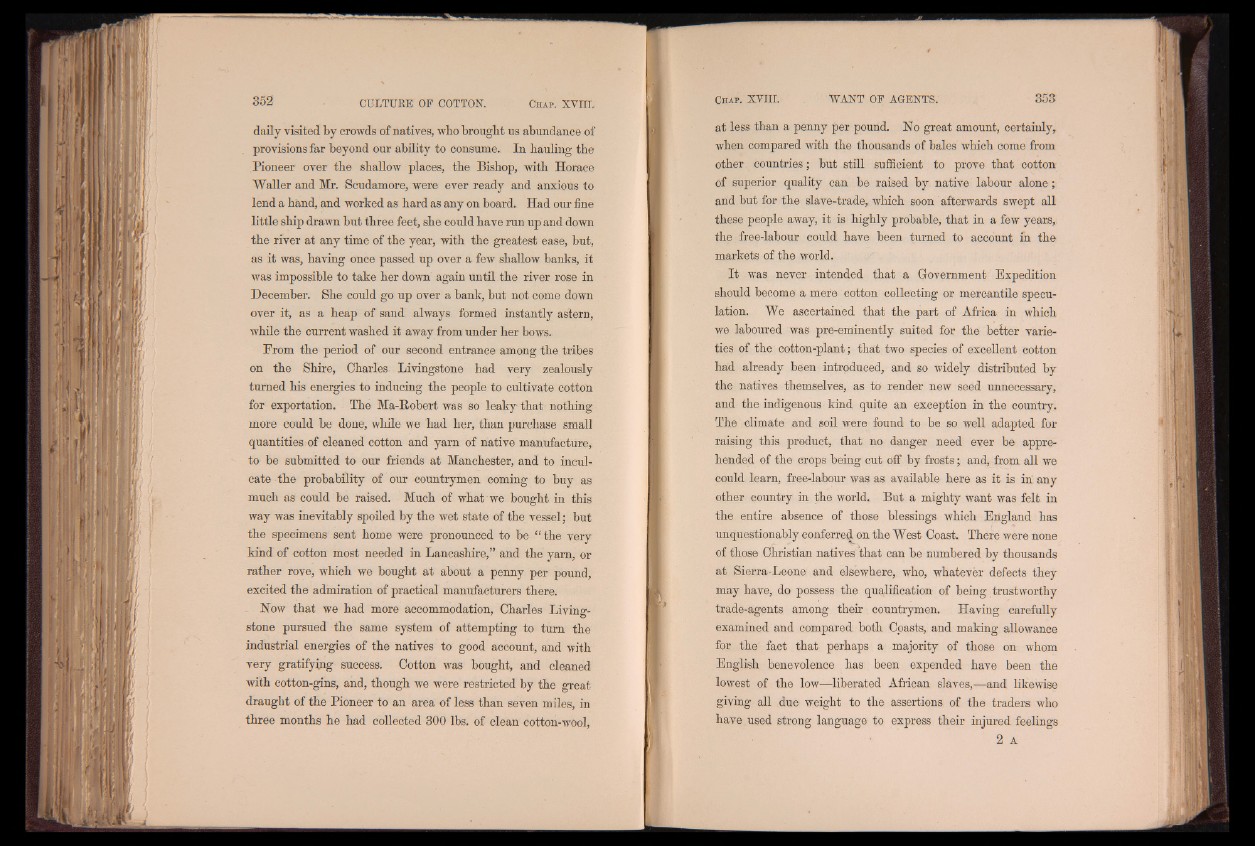
daily visited by crowds of natives, who brought us abundance of
provisions far beyond our ability to consume. In hauling the
Pioneer over the shallow places, the Bishop, with Horace
Waller and Mr. Scudamore, were ever ready and anxious to
lend a hand, and worked as hard as any on board. Had our fine
little ship drawn but three feet, she could have run up and down
the river at any time of the year, with the greatest ease, but,
as it was, having once passed up over a few shallow banks, it
was impossible to take her down again until the river rose in
December. She could go up over a bank, but not come down
over it, as a heap of sand always formed instantly astern,
while the current washed it away from under her bows.
From the period of our second entrance among the tribes
on the Shire, Charles. Livingstone had very zealously
turned his energies to inducing the people to cultivate cotton
for exportation. The Ma-Robert was so leaky that nothing
more could be done, while we had her, than purchase small
quantities of cleaned cotton and yam of native manufacture,
to be submitted to our friends at Manchester, and to inculcate
the probability of our countrymen coming to buy as
much as could be raised. Much of what we bought in this
way was inevitably spoiled by the wet state of the vessel; but
the specimens sent home were pronounced to be “ the very
kind of cotton most needed in Lancashire,” and the yarn, or
rather rove, which we bought at about a penny per pound,
excited the admiration of practical manufacturers there.
How that we had more accommodation, Charles Livingstone
pursued the same system of attempting to turn the
industrial energies of the natives to good account, and with
very gratifying success. Cotton was bought, and cleaned
with cotton-gins, and, though we were restricted by the great
draught of the Pioneer to an area of less than seven miles, in
three months he had collected 300 lbs. of clean cotton-wool,
at less than a penny per pound. No great amount, certainly,
when compared with the thousands of bales which come from
other countries; but still sufficient to prove that cotton
of superior quality can be raised by native labour alone;
and but for the slave-trade, which soon afterwards swept all
these people away, it is highly probable, that in a few years,
the free-labour could have been turned to account in the
markets of the world.
I t was never intended that a Government Expedition
should become a mere cotton collecting or mercantile speculation.
We ascertained that the part of Africa in which
we laboured was pre-eminently suited for the belter varieties
of the cotton-plant; that two species of excellent cotton
had already been introduced, and so widely distributed by
the natives themselves, as to render new seed unnecessary,
and the indigenous kind quite an exception in the country.
The climate and soil were found to be so well adapted for
raising this product, that no danger need ever be apprehended
of the crops being cut off by frosts; and, from all we
could learn, free-labour was as available here as it is in any
other country in the world. But a mighty want was felt in
the entire absence of those blessings which England has
unquestionably conferred on the West Coast. There were none
of those Christian natives that can be numbered by thousands
at Sierra-Leone and elsewhere, who, whatever defects they
may have, do possess the qualification of being trustworthy
trade-agents among their countrymen. Having carefully
examined and compared both Coasts, and making allowance
for the fact that perhaps a majority of those on whom
English benevolence has been expended have been the
lowest of the low—liberated African slaves,—and likewise
giving all due weight to the assertions of the traders who
have used strong language to express their injured feelings
2 A